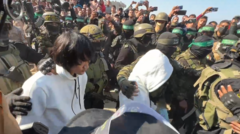In the wake of a deadly Hamas assault on Israel on October 7, 2023, which spurred an ongoing conflict in Gaza, Lt Gen Herzi Halevi, the head of the Israel Defense Forces (IDF), has tendered his resignation, taking responsibility for the military's failures on that catastrophic day. In a heartfelt letter to the defense minister, Halevi expressed his daily burden of accountability for the attack, which claimed approximately 1,200 Israeli lives and resulted in numerous hostages being taken.
Israel's Military Leadership Resigns Amid Criticism Over October Attack

Israel's Military Leadership Resigns Amid Criticism Over October Attack
Israel's military chief acknowledges failures in protecting citizens during the Hamas attack, leading to significant leadership changes within the IDF.
Halevi announced his intent to step down effective March 6, citing both the successes and outstanding challenges of the IDF's current operations against Hamas. He assured members of the Israeli public that efforts would continue to cripple Hamas's capabilities, return hostages, and facilitate the return of displaced citizens to their homes.
Shortly after Halevi's resignation, Maj Gen Yaron Finkelman, commander of the IDF's Southern Command, also announced his departure, admitting his failure to protect residents in the Western Negev region. Their exits come as Israel engages in a recently initiated ceasefire and hostage release agreement with Hamas, recognized as a terrorist organization by several countries including Israel and the U.S.
Reports indicate that prior to the attack, Israeli military and intelligence forces overlooked critical warnings, leading to disastrous repercussions. Following the onslaught, roughly 47,100 Palestinians were reported killed during the retaliatory Israeli strikes, prompting Halevi to affirm the considerable damage inflicted on Hamas's military structure, including the loss of key leadership figures.
In a televised statement, Halevi indicated that a comprehensive inquiry into the IDF's failures on October 7 would be pursued before his departure, ensuring thoroughness and transparency. However, he clarified that this military inquiry would not cover broader systemic issues that may have contributed to the incident, suggesting that an independent commission may be required for a fuller investigation.
Prime Minister Benjamin Netanyahu expressed gratitude to Halevi for his service, albeit while facing criticism himself regarding his leadership during the crisis. Opposition leader Yair Lapid called for accountability at higher levels, urging Netanyahu to resign alongside his entire government.
Amid ongoing negotiations regarding the ceasefire, the situation remains tense as discussions regarding the next phases of the agreement—hostage releases and quantifying aid into Gaza—continue. Political pressure mounts on both military leaders and on the Prime Minister as the situation in Gaza evolves. As the conflict progresses, uncertainty looms regarding the effectiveness of peace negotiations and the potential for lasting resolution.
Shortly after Halevi's resignation, Maj Gen Yaron Finkelman, commander of the IDF's Southern Command, also announced his departure, admitting his failure to protect residents in the Western Negev region. Their exits come as Israel engages in a recently initiated ceasefire and hostage release agreement with Hamas, recognized as a terrorist organization by several countries including Israel and the U.S.
Reports indicate that prior to the attack, Israeli military and intelligence forces overlooked critical warnings, leading to disastrous repercussions. Following the onslaught, roughly 47,100 Palestinians were reported killed during the retaliatory Israeli strikes, prompting Halevi to affirm the considerable damage inflicted on Hamas's military structure, including the loss of key leadership figures.
In a televised statement, Halevi indicated that a comprehensive inquiry into the IDF's failures on October 7 would be pursued before his departure, ensuring thoroughness and transparency. However, he clarified that this military inquiry would not cover broader systemic issues that may have contributed to the incident, suggesting that an independent commission may be required for a fuller investigation.
Prime Minister Benjamin Netanyahu expressed gratitude to Halevi for his service, albeit while facing criticism himself regarding his leadership during the crisis. Opposition leader Yair Lapid called for accountability at higher levels, urging Netanyahu to resign alongside his entire government.
Amid ongoing negotiations regarding the ceasefire, the situation remains tense as discussions regarding the next phases of the agreement—hostage releases and quantifying aid into Gaza—continue. Political pressure mounts on both military leaders and on the Prime Minister as the situation in Gaza evolves. As the conflict progresses, uncertainty looms regarding the effectiveness of peace negotiations and the potential for lasting resolution.























